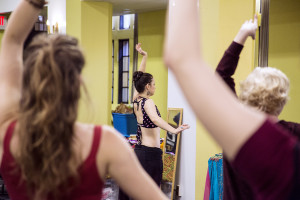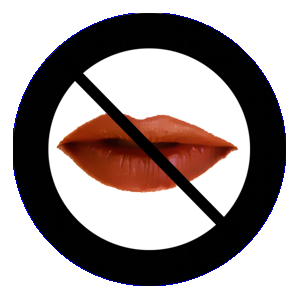I attended the Woodhull Summit on Sexual Freedom last weekend, and while there, took part in an excellent workshop on shame led by sex educator Charlie Glickman. As I was taking notes and live-tweeting as much of Glickman’s fantastic content as I could, I began to notice some points of overlap between shame resilience techniques and the way I teach dance.
The first point of overlap is that when we’re talking about shame, we can discuss not only what it is and how it feels, but also how it looks on the physical body. Glickman defines shame as the sense that one is a bad person, and that shaming oneself or others is often destructive, but it can also lead to positive outcomes, such as giving one an incentive to not do certain unhealthy things again. Yet the discussion of shame can go much deeper than emotion & reaction; we can also talk about the physical behaviors that embody shame.
This is where it gets really interesting to me, since I’m a huge fan of discussing embodiment. According to Glickman’s research, shame gets embodied through:
- Looking away or breaking eye contact
- Physical disconnection
- Closing off one’s heart or slouching
- Silence
If anyone has seen Amy Cuddy’s TED talk about posture, you’ll know that she basically substantiated through research a correlative relationship between posture and performance. People who hold confident “power postures” perform better on all sorts of tests and by all kinds of measures, and people who do the opposite do worse. The lower-confidence, less-powerful postures all align with shame embodied states.
This is where teaching belly dance comes in. Specifically, I teach American Tribal Style® Belly Dance, wherein posture is supremely important. We borrow a lot from flamenco, which accounts for some of our uplifted posture, and ultimately, much of the dance form’s overall aesthetic emphasizes lifted lines, which you can see in the photo of me performing that’s at the top of this blog post. By merely teaching this dance form, and by constantly reminding my students to maintain their posture, I’m helping them with a small mental hack to improve their emotional states. It might be a tiny thing in the context of their lives, and I don’t have peer-reviewed research to back this up, but I believe that I’m doing something to combat shame-induced posture and thereby contributing a little bit of positivity to my dance students’ lives.
The second point of overlap has to do with my teaching practices. There are a number of things that feed shame, such as unspoken rules, bigotry, and unhealthy hierarchy. Guess which things I don’t allow in my dance classes? I make all of my classroom rules explicit, and I do so with gentle humor, like when I correct someone’s “I can’t!”speech to a phrase of “I can’t…yet.” (example: “I can’t shimmy!” “If you’re going to say ‘I can’t’ remember to throw a ‘yet’ in there, so you can’t shimmy yet, but you will.”) I don’t let my students get away with body-shaming statements, even when they sound completely innocuous because they’re so dang common in our culture. I encourage an open learning environment by constantly asking if they have questions, and always making it safe to ask, or to take time for self-care, or really, anything they need.
It might sound like I run a loosey-goosey dance class but believe me, my dance students learn. They drill. They achieve really wonderful things. I try to tell them how proud I am of them, in blog posts like this one and in person.
I’ve felt shame in the dance classroom before, and it’s no fun. I try to structure my dance classes in such a way that my students will rarely go to that place, and if they do, hopefully we can work through it together to get somewhere useful. As Glickman noted in his presentation, not all shame is bad; it can be an adaptive response, depending on how you handle it and what you draw from the experience of it. It’s my hope that if shame ever surfaces in my dance classroom, we’ll work with it and through it together.
The final point I’d like to make is that shame is about disconnection, and its opposites (love, growth, healing, and community) are about connection, emotional and otherwise. My teaching style encourages a sense of trust in the dance classroom: in fellow students, in me, and in the wonderful improvisational dance language we practice together. In a broad sense, my hope is that by teaching a style of dance that gently pushes students into connecting with one another through eye contact and trust (because as a follower you have to trust the leader giving the cues for the next move, and when you lead, you have to trust the followers to be synced up with you), I’m paving the way for connection rather than disconnection, for empathy and love rather than shame.
I know that the sense of connection I found through tribal dance has benefited me in innumerable ways, including saving my life during a rough patch. This discussion of shame vs. connection is still a little abstract, and again, I don’t have empirical studies to back me up here. But when I see my dance students returning session after session and sticking with the style, I see them blossoming and incrementally becoming more trusting of each other when they dance, and more confident in general.
Sometimes people remark on how I do such disparate things in my life – writing, folklore, sex education, dance – and this is one example of how everything ties together. I went to a sexual freedom conference, attended a fantastic panel on shame, and realized that my dance teaching style is implicitly geared toward removing shame from the dance classroom in order to foster connection, confidence, and caring. How cool is that?!



